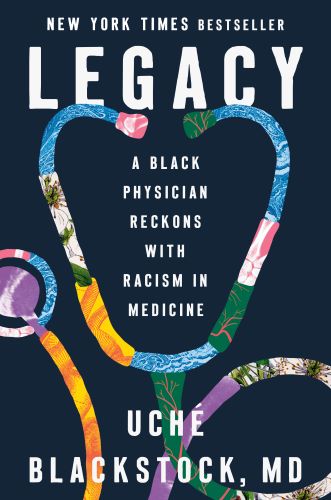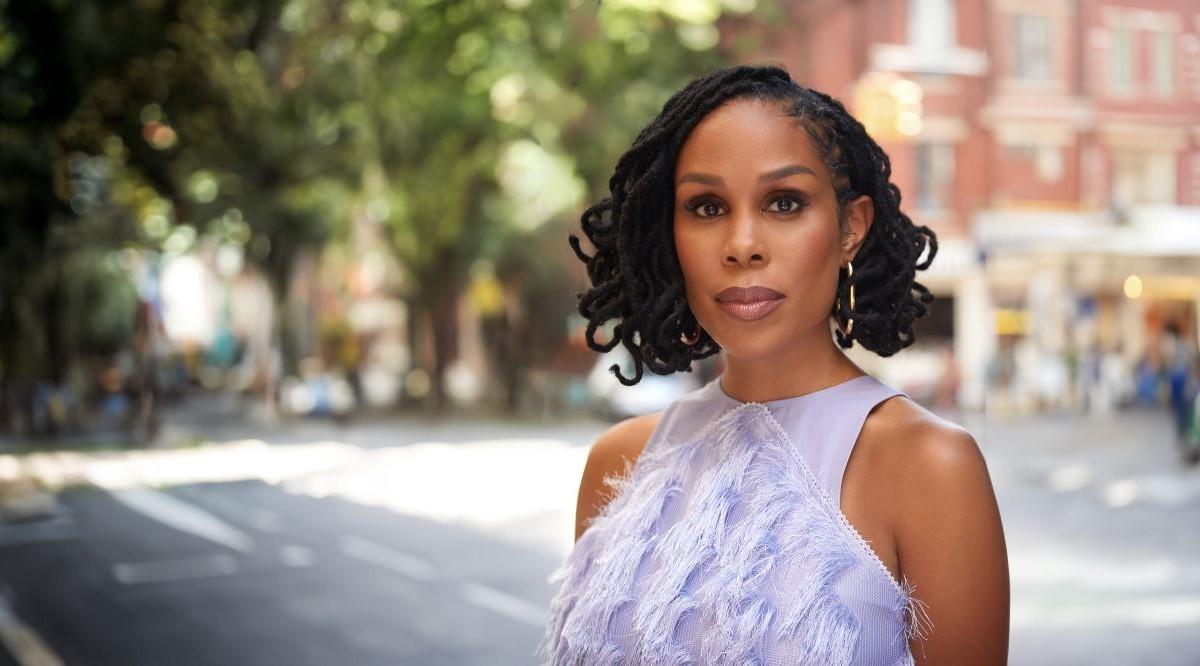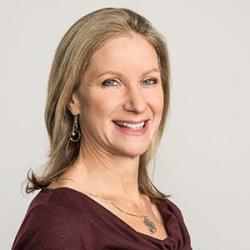From the time she was a little girl, Uché Blackstock wanted nothing more than to follow in the footsteps of her mother, a Harvard-educated physician who provided culturally competent care to her Kings County Hospital patients — long before most people knew what the term meant.
Most days, Uché and her twin sister, Oni, would walk over to the Brooklyn hospital after school, where they would do their homework and wait until their mother was finished seeing patients, before heading home together. Some days, they would even get to meet her patients, and watch her interact with them. “She really understood the backgrounds of her patients, the lives that they had, in a way that I think maybe other physicians caring for them could not understand as intimately,” Blackstock recalls.
And so, after graduating from Stuyvesant High School, Harvard University, and Harvard Medical School, Blackstock decided to do her residency in emergency medicine at Kings County. It was there that she began to fully understand the stark health inequities that so deeply impacted her patients’ lives and health, and how under-resourced the health care facilities that care for them are.

It’s a journey that she recounts in her New York Times bestselling memoir, Legacy: A Black Physician Reckons with Racism in Medicine, and one that eventually led to her departure from academic medicine and her founding of Advancing Health Equity — a consultancy that provides trainings, organizational assessments, and solutions to hospitals and health care systems to help them create more diverse, inclusive work environments and provide more equitable care.
AAMCNews recently sat down with Blackstock to talk about her personal journey, the backlash against DEI initiatives in medicine, and the work that needs to be done to combat racism in health care.
This interview has been edited for length and clarity.
You write in your book about deciding to do your residency at Kings County Hospital, where your mother worked for a time, after graduating from Harvard Medical School. And how some even questioned the decision to work at an under-resourced hospital like Kings County. Can you tell me more about that decision?
I had the experience in undergrad and in medical school of being in environments that were very unlike the ones that I grew up in. Especially in medical school, I didn’t really care for many patients who looked like me. And so I just really felt this pull to come back to Brooklyn, to do my residency in a hospital where my mother had worked for so many years and to care for a patient population that was very similar to the population of the neighborhood where I had grown up. Also, being a Black physician, I knew that the data shows that racial concordance in patient-physician relationships, especially for Black patients, is actually very important. And so that was one of the reasons why I went back to train at Kings County and I’m so glad that I did. It’s a very under-resourced setting, but it really was an environment where I was able to unlearn and relearn and recognize the gaps in my education, where I was able to see how disease and illness manifested in the emergency department, in my patients’ bodies, and begin to really understand how systemic factors like racism impact their health.
You then took a faculty position at NYU, where you cared for two different patient populations — one at the public hospital (Bellevue) and another at the private hospital (Tisch). Can you talk a little bit more about that?
When I went to NYU, I had this very stark experience of working at Bellevue, which is the oldest public hospital in the country, and working at NYU’s Tisch Hospital, which is a private hospital, and having ER shifts in both places where the resources that we were working with were disparate; they couldn’t have been so incredibly different. But also how patients were treated was also different and what was acceptable at one hospital wasn’t at the other. What struck me was the silence from my colleagues about talking about these differences, and there being a different culture to how you practice in one hospital versus the other.
You mention in your book that you weren’t taught about the impact of racism in medical school, that it was something you learned and experienced as a physician. How do we begin to address this?
It can feel so incredibly overwhelming, which is why I end the book with a call to action. I speak to medical schools about what we can do to create more diverse, inclusive learning environments. What should the curriculum include, in terms of the history but also current day? How can we educate our future physicians to understand our patients’ lives in a more holistic way so that we can deliver them the care that they truly need? I talk about my mother delivering culturally responsive, structurally competent care [and] I think that physicians do have an obligation to understand the barriers or inequities that may impact their patients’ health, and understand how to connect them with whatever resources they need. There’s also a role in terms of faculty development. It shouldn’t be punitive, but we want to help faculty understand how systems impact health.
I also think hospitals have a huge role to play. In the book, I talk about how hospitals have perpetuated this idea of race-based medicine, for instance, with two different values of kidney functions: one for Black people, one for non-Black people. That was something that I saw when I was practicing and didn’t understand why there was this difference, but again, it was rooted in myths about biological differences between Black patients and other patients. So, I do think that hospitals need to reflect on their role in perpetuating these myths about biological differences, and also how they can implement processes, protocols, and procedures to measure health equity. How can they make sure they’re keeping track of, for example, how prescription opioids are being prescribed to their patients, and differences in how long patients are waiting to be admitted to the hospital? I’ve worked in institutions where Black patients waited 80 minutes longer to be admitted than other patients. Unfortunately, a lot of the bias and racism is so deeply embedded in our systems, we need to have procedures to mitigate that bias. So that requires intentionality.
Finally, I do call on policymakers [to] think about health as not just what’s happening within health care, but also what’s happening outside of health care. We know that where someone lives, where they work, where they’re educated … that also impacts how healthy they are.
Speaking of health policy, can you talk about the EDUCATE Act, introduced by Dr. Greg Murphy, that would withhold federal funding for medical schools that enact policies and requirements related to DEI. You’re advocating to advance DEI at the same time there’s this backlash against it. What’s going on?
We’ve seen this in regards to CRT [critical race theory] and DEI and other industries and disciplines. I think that when there are any signs of progress for Black people or people of color, there is often this backlash. And unfortunately, it couldn’t come at a worse time because a lot of these health inequities have worsened. Black maternal mortality rates — those have actually worsened, for all racial demographic groups, but mostly for Black birthing people. Even life expectancy for Black and Indigenous people continues to go down in the United States compared to other high-income countries. So overall, as a people, Americans are not doing well, but of course it impacts people of color the most. … No one is saying that we should intentionally be race-conscious, but we should be racism conscious. We should understand how the Flexner Report led to a decrease in the number of Black physicians that we see today, for instance. For the people who signed on to this bill, I think that they see DEI as a threat to their very existence or to the way that medicine has traditionally been practiced. But we know that the way medicine has traditionally been practiced doesn’t necessarily benefit all of our patients. We know that we can do better and that we have to do better. The statistics show us. This is not about finger-pointing and saying, ‘You physician over there. You are not properly caring for this patient.’ It’s about creating a culture within medicine where we are recognizing the barriers and inequities that our patients of color specifically face and being able to deliver them the care that they need.
When you were at NYU, you were appointed faculty director of the Office of Diversity Affairs. But it wasn’t long before you realized that they weren’t looking for someone who would make a real impact. Rather, it was more of a symbolic gesture.
It was an incredibly disappointing experience, as I share in the book, to be handpicked for that role within the Office of Diversity Affairs. I was so excited. I thought I would do impactful work and then to recognize that it was just a figurehead role was incredibly demoralizing. This happens often, I think, in organizations or institutions that are not truly committed to those missions and those goals of really creating a more diverse, inclusive learning environment or work environment. And because there’s so few of us in academia, [we also] have to be a mentor for our students — we do this work, which I consider invaluable and priceless, because our students need us, and they are also going through experiences where they are not able to focus on their academic obligation. They’re the ones that are leading the diversity efforts because the schools aren’t doing enough. And because that work is not valued, you end up feeling undervalued and underappreciated.
You ultimately left NYU — and academic medicine altogether.
I always thought that I would have a lifelong career in academic medicine. It’s an environment that I find incredibly intellectually stimulating, being able to work with medical students and trainees, caring for patients, doing research. I love that environment. But it became very clear to me that I couldn’t stay there, I couldn’t stay at NYU, but also I had to leave academic medicine. I needed to be able to show up authentically to the work that I wanted to do, and I was able to do that by founding my organization — Advancing Health Equity — which, this month, is five years old. I didn't know anyone who had left academic medicine to become essentially a social impact entrepreneur. I didn’t know anyone who had left academic medicine. I had been at NYU for almost 10 years. I had been checking off all the boxes, doing what I thought I was supposed to do. And then I went up for Associate Professor and I was denied the first time. It felt like a slap in the face. And I got to the point being in that environment where I forgot that I was someone who had gifts to share. I actually started feeling very average, and so leaving, and working on Advancing Health Equity and being able to do it in a way that was authentic to me, was incredibly exciting and transformative. And when I look back and see all that I’ve been able to do over the last five years, I could not have imagined it.
Do you think academic medicine has made any progress in advancing DEI?
I think academic medicine can do more, much more. There has been progress in some ways and not in others. When we look at the numbers of Black physicians, they have not budged, and especially among Black male physicians, that percentage has gone down. Obviously, we’re in a very critical time right now. I would love to see academic medicine leading in terms of being innovative. [For example] HBCU medical schools educate the most Black physicians, and I would love to see predominantly white medical schools in some way help with that heavy lifting, whether it is sharing resources, sharing faculty, sharing research. That can happen through collaborations with HBCUs, and not just the HBCUs that have medical schools, but also the ones that may just have colleges.

